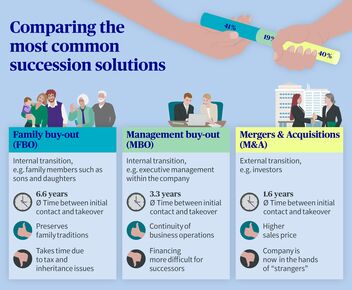
Management buy-out: The succession solution at a glance
More than 75,000 Swiss SMEs are about to hand over corporate responsibility to the next generation. Many entrepreneurs will hand over their life's work to family members. The alternatives to family succession are becoming increasingly important with demographic changes. One example of this is the management buy-out (MBO) which is where a company is sold to the existing management, usually the managing director or a leading employee.
But how does this type of management buy-out work? What are the advantages and disadvantages for and against this succession solution? What special features do companies have to look out for compared to a family succession or selling to external third parties? We have put together the key aspects for you.
How does a management buy-out work?
Management buy-out is succession planning from within a company. If the owner of a business retires, the current management takes over management responsibility. For this to happen, all or some of the current owner's shares are sold to the existing management or leading employees.
An MBO is closely associated with an employee buy-out: Here too, the previous owner transfers the business to the employees, but the workforce are also shareholders as well as the management.
How does a management buy-out work?
On average, an MBO takes around three years, including the transition phase. Without the transition phase, the expected period is 18 - 24 months. The process takes place in several steps:
- Looking for an internal successor and checking qualifications
- Preparing the company's valuation and other necessary documents (e.g. strategic company profile)
- Initial discussions (gathering personal and financial options, setting the time horizon)
- Negotiating and clarifying the finance
- Clarifying tax factors and due diligence
- Signing contract and transferring business
The relationship of trust between owner and successor can speed up the transfer process in some places. However, when it comes to an internal succession, the issue of finance can take longer compared to other succession solutions, if private equity companies are involved, for instance. As an alternative, bank finance combined with vendor finance is often used. Regardless of which finance model you prefer, you should leave enough time for preparation and planning.
What are the advantages of a management buy-out?
1. Continuity of business
If you sell your company to the existing management, your successor is already familiar with the company's internal processes, company culture and relationship with partners, suppliers and customers. This knowledge helps to seamlessly shape the management change for all persons involved and preserve the continuity of business processes. This reduces the uncertainty that a change of management can bring.
2. Relationship of trust between seller and buyer
If your company succession involves a long-serving employee, this makes it easier for many entrepreneurs to hand over their own life's work. This is because you can rely on the fact that your company will continue in your interest, as the strategy and future vision will be formulated together with your successor. Furthermore, you already know your successor's strengths and weaknesses, and lack of qualifications can be systematically addressed until the business is handed over. This way, you'll know that your company is in good hands over the long term.
3. Encouraging employee motivation
The prospect of a management buy-out can stimulate the motivation of leading employees and your entire workforce. This signals their trust and strengthens the sense of togetherness in the company. Another plus point: Having an esteemed colleague as the new owner is usually much better accepted than an outsider.
4. Shorter handover period & retaining know-how
Your management is aware of your company's success factors and has comprehensive knowledge of internal processes. As a result, the handover period in an MBO is shorter compared to other succession solutions. Passing on know-how is also easy due to the close working relationship. An additional advantage: In the selling process, no sensitive information about your company is passed on externally, thereby significantly reducing the entrepreneurial risk of disclosure of internal company details to third parties.
What are the disadvantages of a management buy-out?
1. Lower selling price and difficulty in sourcing funding
In many cases, employees do not have sufficient resources to fund a company sale. For this reason, owners often grant a loyalty discount for a management buy-out which means that they achieve a lower purchase price.
Furthermore, successors usually have to resort to borrowing from a bank to fund the transaction. This means repaying interest and amortization for years after the takeover. This money is not available for investing in the business which can be a competitive disadvantage. One possible solution is vendor finance which the current company owner extends to the successor, thereby giving greater financial flexibility, as it can be regarded as shareholders' equity.
2. Operational blindness
To survive successfully on the market, business processes must be regularly analyzed and updated where necessary. A change of management is a good time to create fresh impetus and question the status quo. If your successor has worked for the company for several years, there's a danger of operational blindness. The possible consequence of this is that development potential goes unrecognized and remains unused.
Corrective action creates a good preparatory basis: Together with your successor, implement strategic analysis tools (such as Business Model Canvas or a SWOT analysis) to sharpen the focus on relevant factors such as market developments and your competitor situation.
3. Hierarchy differences during negotiations
Negotiations between owner and successor are an integral part of succession planning. To achieve agreement that satisfies both parties equally, this should be borne in mind and carried out with the necessary pragmatism. The personal relationship and hierarchy difference between vendor and purchaser can make the process more difficult: Instead of line manager and employee, potential business partners face each other. Here it can help to involve independent third parties to act as advisors and mediators.
4. Challenge of changing role
In their role as the owner, your successor is faced with new duties. As well as dealing with daily operational business, visionary and strategic skills are required to run the business. Not every manager has the necessary entrepreneurial spirit to successfully manage a business. You can give assistance as the previous owner: Choose your successor carefully and pass on your knowledge and experience in good time.
Comparison of the most common succession solution: MBO, FBO & M&A
In Switzerland, the family buy-out, mergers & acquisitions and management buy-out are the most common succession solutions. They differ as follows:

Comparison of management buy-out, family buy-out and mergers & acquisitions
Family buy-out (FBO): Family succession
In a family buy-out, company succession takes place within the family, usually involving the children. It is the most common succession solution in Switzerland and occurs in around 40 percent of cases. Family succession is the most time-consuming in terms of implementation: The period from planning to handing over the company lasts almost six years, mainly due to the highly complex nature of tax and inheritance factors. The major advantage of a family succession is that the tradition will be preserved and a life's work will continue in the family. The disadvantage is the lower selling price: A family discount is often granted which means that the price is below the company's actual market value.
Compared to succession from within the company, this succession option is best suited to companies looking to preserve the family tradition and ones that are not under any time pressure to find a succession solution.
Management buy-in (MBI) or mergers & acquisitions (M&A): Sale to external third parties
The management buy-in or mergers & acquisition describes the sale of a company to external third parties. Potential buyers are competitors, private equity investors, a financial investor or external management. This type of succession solution is the quickest: On average, it only takes around a year and a half from preparation to signing the contract. Handing a company over to third parties usually generates the highest selling price - depending on the buyer, this can be up to 40 percent above the control premium. The disadvantage for many entrepreneurs is the idea of handing over their life's work to outsiders: Unlike an MBO or FBO, company management will not continue from within.
Compared to the management buy-out, selling to third parties is particularly advisable if the company succession can be completed quickly and a high selling price is be achieved.
Conclusion: Future-proof your company
There are many advantages to a management buy-out: The successor's qualities are known, the time frame is visible and the business processes can continue uninterrupted. There are also no restrictions in terms of sector and scope: An MBO is just as possible for small and medium-sized enterprises as it is for large concerns. If you're aware of a few factors in implementation and seek professional support at critical junctures, an MBO is a good opportunity to secure the future of your company over the long term.






